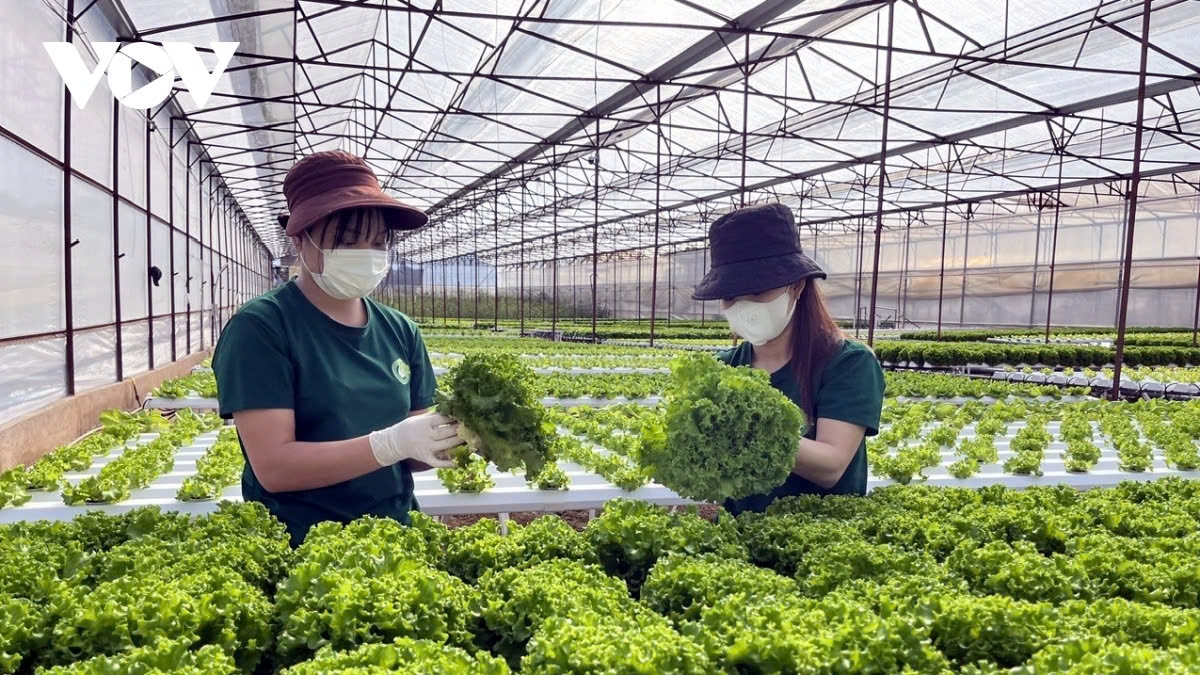Green transition – the key to businesses’ global market success
VOV.VN - As sustainability becomes a key priority in global markets, businesses are increasingly focusing on producing environmentally friendly products which can meet growing consumer demand and fully comply with regulations.
Green products are receiving increasing attention as regulations such as the Carbon Border Adjustment Mechanism (CBAM) and EU Regulation on Deforestation-free Products (EUDR) have had a significant impact on the production and export of Vietnamese businesses. This is especially relevant for firms exporting to the EU market, particularly as the CBAM came into force in October, 2023, and the EUDR is scheduled to take effect from December 30, 2025.
Greening production – the inevitable trend

Experts point out that complying with green standards is not only a challenge, but is also a great opportunity for Vietnamese enterprises to enhance product value and expand market reach. In particular, the European market is increasingly demanding sustainability in products that create pressure on the one hand but drives businesses to shift towards green production models on the other hand.
Highlighting the importance of mechanisms and regulations from export markets, Tran Tuan Minh, director of the Vietnam-ASEAN Trade and Investment Promotion Center, states that the CBAM will have an immediate impact on four of Vietnam’s export sectors, namely steel, cement, fertilizers, and aluminum. Later, with the impending impact of the EUDR, sectors specialising in agriculture, seafood, timber, textiles, and industrial products will also face pressure from Europe’s carbon tax.
“Businesses need to proactively adapt not only to survive but also to thrive in the global competitive environment,” emphasises Minh.
Green products can reduce consumption rates, lower waste treatment costs, and result in positive economic outcomes. Phung Ngoc Bo, head of the Technical Department at the Vietnam National Chemical Group, believes that green standards in the chemical industry also serve to enhance the position of businesses, especially when it comes to integrating into the global supply chain.
“Chemical companies that manage their environment well and eliminate waste can easily penetrate demanding markets, particularly the EU market. Currently, the costs of technology and production for green products are still high, and mechanisms and policies, despite their availability, are not yet clearly defined for the chemical industry,” notes the official.
The leather and footwear industry, which is highly integrated, faces the urgent need to meet sustainable green standards. According to Phan Thi Thanh Xuan, vice president and general secretary of the Vietnam Leather and Footwear Association (Lefaso), sustainability requirements were initially set by brands, but now they have been codified into law. For leather and footwear, major markets such as the United States and the EU demand very high standards.
“The EU market has begun to impose green transition requirements, particularly with the introduction of laws on supply chain tracing and laws against deforestation. In the future, there will be a series of new laws, including extended producer responsibility, eco-labeling, eco-design, and other requirements, which pose significant challenges for the leather and footwear industry, as these two markets account for up to 70% of export turnover,” reports Xuan.
Green transition for sustainable engagement

Green transition in supply chains is now considered a surviving requirement for businesses globally. The Ministry of Industry and Trade has recently introduced policies to support businesses in developing sustainable supply chains in general, specifically in greening textile, footwear, and leather supply chains. Dr. Nguyen Van Hoi, director of the Institute for Industrial Strategy and Trade Policy and Strategy, says that the Ministry of Industry and Trade’s programmes support firms in accessing technology transfers, thereby meeting increasingly strict international market standards.
“The National Trade Promotion Programme supports sustainable export promotion in all markets. In addition, national industrial promotion programmes and support industries have helped the industrial sector meet development requirements for raw materials and components, better meeting market standards,” says Hoi.
According to Nguyen Thanh Phuong, director of the Department of Industrial Safety and Environmental Engineering at the Ministry of Industry and Trade, the greatest challenge in greening the industry lies in awareness and implementation. To promote industrial greening, firms must focus on fully complying with environmental protection regulations, addressing climate change, and reducing greenhouse gas emissions.
“Businesses must research and calculate green solutions to reduce emissions and save energy to solve the production cost problem. From pilot models, businesses will choose the most optimal solutions,” says Phuong said.
Demanding markets are tightening regulations on green products which in turn requires enterprises to play by the rules if they wish to stand firm globally. Businesses therefore have no choice but to proactively change their mindset so that the green transition process can be implemented more quickly and effectively, which in turn will help enterprises to maximise opportunities from international economic integration.


